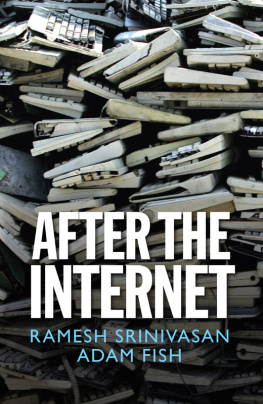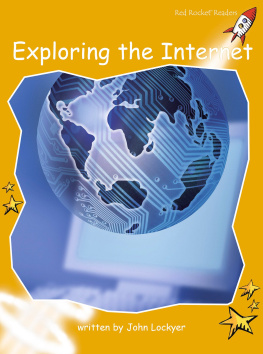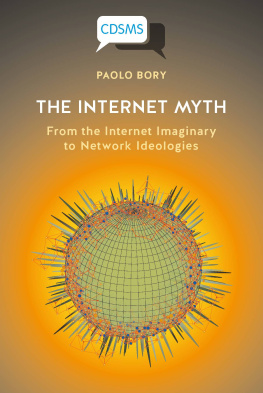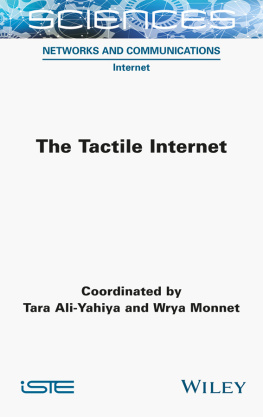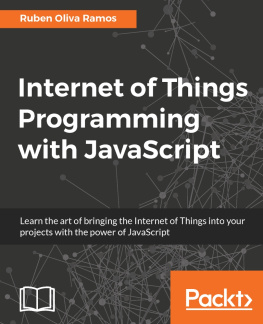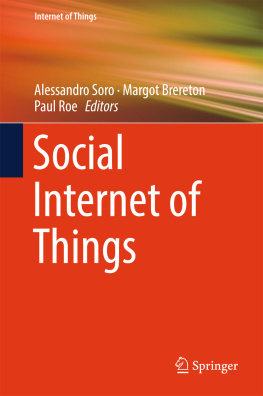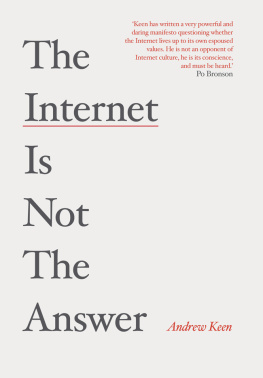
Dedication
Dedicated to Levi Felix (19842017)
Copyright page
Copyright Ramesh Srinivasan and Adam Fish 2017
The right of Ramesh Srinivasan and Adam Fish to be identified as Authors of this Work has been asserted in accordance with the UK Copyright, Designs and Patents Act 1988.
First published in 2017 by Polity Press
Polity Press
65 Bridge Street
Cambridge CB2 1UR, UK
Polity Press
101 Station Landing
Suite 300
Medford, MA 02155
USA
All rights reserved. Except for the quotation of short passages for the purpose of criticism and review, no part of this publication may be reproduced, stored in a retrieval system or transmitted, in any form or by any means, electronic, mechanical, photocopying, recording or otherwise, without the prior permission of the publisher.
ISBN-13: 978-1-5095-0617-0
ISBN-13: 978-1-5095-0618-7 (pb)
A catalogue record for this book is available from the British Library.
Library of Congress Cataloging-in-Publication Data
Names: Srinivasan, Ramesh, author. | Fish, Adam, author.
Title: After the Internet / Ramesh Srinivasan, Adam Fish.
Description: Cambridge, UK ; Malden, MA : Polity Press, 2017. | Includes bibliographical references and index.
Identifiers: LCCN 2017009318 (print) | LCCN 2017026160 (ebook) | ISBN 9781509506200 (Mobi) | ISBN 9781509506217 (Epub) | ISBN 9781509506170 (hardback) | ISBN 9781509506187 (pbk.)
Subjects: LCSH: InternetSocial aspects. | InternetEconomic aspects.
Classification: LCC HM851 (ebook) | LCC HM851 .S725 2017 (print) | DDC 302.23/1dc23
LC record available at https://lccn.loc.gov/2017009318
Typeset in 10.5 on 12 pt Sabon by Toppan Best-set Premedia Limited
Printed and bound in the United Kingdom by Clays Ltd, St Ives PLC.
The publisher has used its best endeavours to ensure that the URLs for external websites referred to in this book are correct and active at the time of going to press. However, the publisher has no responsibility for the websites and can make no guarantee that a site will remain live or that the content is or will remain appropriate.
Every effort has been made to trace all copyright holders, but if any have been inadvertently overlooked the publisher will be pleased to include any necessary credits in any subsequent reprint or edition.
For further information on Polity, visit our website: politybooks.com
List of Figures
Interface of the Tribal Peace Native American system
The first version of a fluid ontology created with tribal communities across San Diego County
Zuni leadership examining an indigenous map
Zuni community members collectively viewing digital objects via Amidolanne
Higinio O. Ochoa III's selfie-incrimination
Ross Ulbricht's LinkedIn page
GCHQ's JTRIG computer network attacks (CNA)
Social media revolution t-shirt
The Tweet-Nadwa (or Tweet up) bringing activists together with real-time conversations online in Cairo, June 2011
Mosireen space
Tahrir Cinema
Military helicopter dropping flags on protesters in Cairo's Tahrir Square, early July 2013
NSA's New Collection Posture
NSA Data Center in Utah
The house in Reykjavik where WikiLeaks worked
Acknowledgments
Ramesh is truly grateful to his dear friend and conspirator Adam Fish for the inspiration to work together to fight for an internet in line with principles of democracy and social justice. This book marks but the latest in nearly a dozen years of collaboration. It could not have been written by either of us alone but comes from the union of the authors and exceeds the sum of each of us individually.
Ramesh thanks his sublime partner Syama for all her support in helping him dedicate himself to making this book possible. He also is truly grateful for the presence, love, and care of his parents Seenu and Sita and brother Mahesh. He thanks his incredible informants from across the world who have taught him the power of fighting for community sovereignty, equality, and a more ethical world. He thanks the National Science Foundation, UCLA, the Southern California Tribal Chairmen's Association, the A:shiwi A:wan Museum and Heritage Center, Rhizomatica, and the inspiring figures, particularly from the Mosireen collective, with whom he broke bread over three years in the midst of Tahrir Square and its transformations.
Adam thanks Ramesh for a decade of collaborative creative work and play. Lucas Follis deserves thanks for sharing his wisdom and generating many ideas around hacktivism. Ideas for were first explored in discussions with him and resulted in A. Fish & L. Follis, Edgework, State Power, and Hacktivists, H au : Journal of Ethnographic Theory, 5(2) (2015): 38390 and A. Fish & L. Follis, Gagged and Doxed: Hacktivism's Self-Incrimination Complex, International Journal of Communication, 10 (2016): 3281300.
The research in Iceland was funded by the European Cooperation in Science and Technology, COST Action IS1202; Security Lancaster; the Faculty of Arts and Social Sciences at Lancaster University; and the Department of Sociology at the University of Lancaster. Thanks go out to the University of Iceland for their generous visiting professorship in the summer of 2015. Alex Johnson should be thanked for her help in finding pirates and data centers in Iceland. Adam thanks his wife Robin for her love, support, and endurance, and his daughter Io for providing play and comic relief.
Together, we dedicate this book to the memory of our inspiring friend and brother Levi Felix, a visionary in his life. His work focused on creating greater mindful awareness in our interactions with technology remains a guiding light for us both.
Introduction: After the Internet
We are creating a world where anyone, anywhere may express his or her beliefs, no matter how singular, without fear of being coerced into silence or conformity.
(Barlow 1996)
In his bold declaration of the independence of cyberspace, John Perry Barlow, founder of the Electronic Frontier Foundation and a well-known figure in internet counterculture circles, proudly announced that networked technology would bring the world together as a singular and free space. His words, quoted above, speak to optimistic and aspirational principles that imagine the internet as autonomous from control, surveillance, and manipulation. This reflects an ideology that prioritizes individual liberty over the practices of the state or society.
These words from Barlow represent an important philosophy by which the internet has been imagined and described. Yet now, over 20 years since Barlow's declaration, the internet and what it stands for remains contested. Commercial, governmental, public, and activist interests are in conflict and dialogue as we think about the future of the internet.
We have long heard about the democratic promise of the internet. As a decentralized network, the internet would empower its users equally. It would evade the top-down political economies of corporations that have monopolized older media networks of television and radio. It could embolden citizens to share their stories, design different sites, and mobilize and network from the grassroots. It would transform our world into a global village (Srinivasan 2017). Yet whose global village are we speaking about? And has such a global village of equality come to be?
Next page
